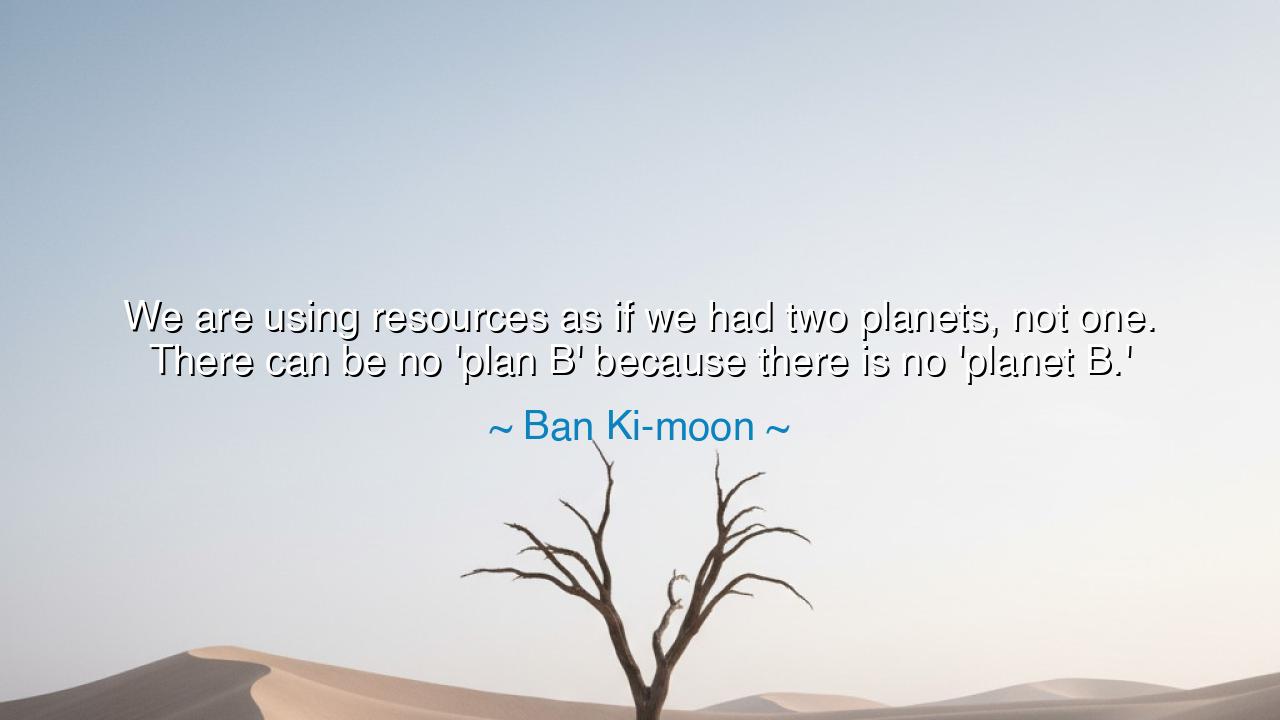
We are using resources as if we had two planets, not one. There
We are using resources as if we had two planets, not one. There can be no 'plan B' because there is no 'planet B.'






In the solemn and visionary words of Ban Ki-moon, former Secretary-General of the United Nations, we hear both a warning and a plea: “We are using resources as if we had two planets, not one. There can be no ‘plan B’ because there is no ‘planet B.’” In this single utterance lies the cry of a guardian for a world in peril—a reminder that humanity’s hunger for more has blinded it to the limits of its home. Ban Ki-moon, who witnessed the struggles of nations and the silent suffering of the earth, spoke these words not to condemn, but to awaken—to remind the children of this planet that they are not conquerors, but caretakers of a fragile and sacred sphere.
The meaning of this truth is as clear as the sunrise and as heavy as the storms it foretells. To live as though we had two planets is to live in denial, to pretend that what we destroy will be replaced, that what we waste will be renewed without effort. But the earth is one, ancient and finite, and she has already begun to show the scars of our excess. The air grows thick with smoke; the oceans rise, swallowing coasts and homes; forests fall to the roar of machines; and species vanish like fading stars. Ban Ki-moon’s words ring out as a call to humility—to remember that every breath we take, every grain we eat, every drop we drink, is a gift from this single, irreplaceable planet.
In ages past, our ancestors understood this better than we do. They tilled the soil with reverence, hunted with restraint, and built their homes in harmony with nature’s rhythms. They saw in the sun and the rain the faces of the gods, in the mountains and the seas the voices of eternity. Yet as human power grew, reverence gave way to greed, and stewardship turned into dominion. The industrial age brought progress, yes—but it also unleashed a hunger that knows no end. Now, as Ban Ki-moon reminds us, we stand at the edge of consequence: our consumption exceeds the planet’s renewal, and the balance of life itself trembles in our hands.
Consider the story of Easter Island, once lush and green, home to a thriving people who carved their great stone faces to honor their ancestors. Yet in their pursuit of glory, they felled every tree, exhausted their soil, and stripped the land bare. When the last tree fell, their civilization collapsed—its people left starving, its monuments standing as tombstones to their own short-sightedness. This tale, repeated by time, is not about a distant island alone—it is about all of humanity. We are the new sculptors, our machines the chisels, our cities the statues. Ban Ki-moon’s warning echoes across millennia: if we do not change, our world may one day stand silent like that island, a monument to what once was.
And yet, within his warning lies hope. For Ban Ki-moon does not speak of doom, but of possibility. He calls for a transition—to renewable energy, to sustainable living, to a new covenant between humanity and the earth. He reminds us that innovation and compassion, when united, can restore what neglect has broken. Just as the seed needs only light to rise again, so too can our world recover if we act with wisdom. Nations can invest in clean power; citizens can live simply and consume wisely; leaders can think not only of profit, but of posterity.
There is a moral heart beating beneath his words—a call to responsibility. For the earth does not belong to us alone. It belongs to those who will come after, to the children who will inherit the skies we cloud and the rivers we poison. To them, we owe a debt not of words but of action. There is no ‘planet B,’ he says, and therefore no escape from our duty. We must learn to live not as owners, but as kin—humans among the greater family of creation.
So, O listener, take this as both warning and vow: cherish the ground you walk upon, for it is the only ground you will ever have. Let your choices—what you buy, what you waste, what you preserve—be your prayer of gratitude to this living world. Use less, protect more, restore what is lost. Teach others not to take without giving, not to burn without planting, not to live without remembering.
For in the end, Ban Ki-moon’s words are not about despair but awakening. The earth does not ask for perfection—only for awareness, for care, for balance. There is no Plan B, no hidden refuge among the stars, no second Eden waiting in the wings. There is only this blue planet—ancient, wounded, and still miraculously alive. If we honor it now, it may yet forgive us; if we love it fiercely, it may yet endure. Let this be the legacy we leave: not a world consumed, but a world renewed.






AAdministratorAdministrator
Welcome, honored guests. Please leave a comment, we will respond soon